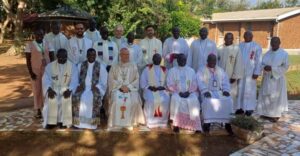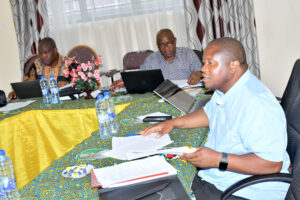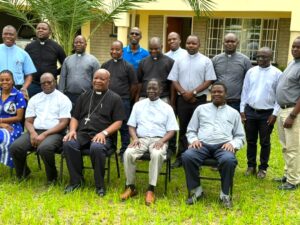KENYA: Caritas Kenya Hosts Regional Dialogue Conference On Karamoja Cluster

Caritas Kenya hosted Caritas Uganda and Caritas Ethiopia to the 2nd regional dialogue conference between 29th November to 1st December 2016 in Kitale Diocese. This was a follow up workshop to the one held in Moroto Uganda in 2015 in which several resolutions were made and recommendations provided for various actors. The Kenya dialogue focussed on reviewing implementation of these resolutions and recommendations and discussing emerging security and development issues in the Karamoja cluster region.
The Kenya Conference brought together over thirty participants from across the three countries with stakeholders ranging from the religious, Governments Security organs, grass roots representatives among others.
Speaking during the Conference, the Bishop of Kitale, Rt. Rev. Maurice Crowley emphasized on the need to make specific interventions and plans of actions that would cause transformation to the people of the Karamoja Cluster. He noted that most initiatives have been done in the region and they were not able to bring the much needed transformation because they lacked specificity, lacked good coordination and that they never focused on the immediate needs of the Karamoja Cluster people. He challenged Caritas Kenya, Uganda and Ethiopia to avail staff at the grass roots who would be able to journey with the people.
Bishop Crowley, noted that Education for the people of the Karamoja Cluster, especially in Kenya was critical. This education would be able to change their belief system in the traditional paradigm in which they have been brought up to believe that killing for cattle is a way of life and a solution to their problems.
The Caritas Director of Uganda, was happy that the dialogue conference that brought together all stakeholders in the Karamoja cluster was discussing the issue of peace and development for the people of Karamoja. He was also happy that all the participants share in the aspiration of peace and poverty eradication, which is a core mandate of Caritas organizations which aim at giving dignity to all people of God.
Participants had an opportunity to share success stories that had been achieved out of the collaborative approach taken towards addressing the issues surrounding the Karamoja Cluster. They were optimistic of a brighter future for the Karamoja people, given the gains that had been made in the short time the collaboration has been in place.
At the end of the Conference, the participants were all in agreement that if the required transformation of the Karamoja people was to be achieved, it was important that the coordination of the implementation of the activities taking place in the region is of the essence. A mapping of who is doing what and whee alongside the roles and responsibilities of the stakeholders will be worked on as part of improving coordination.
A major challenge that was noted was the fact that disarmament had not been done in Kenya as effectively and efficiently as Uganda had done and participants from Kenya were to lobby the relevant bodies to carry out the disarmament process.
In 2014, Caritas AMECEA commissioned a study on the development and security challenges in the Karamoja Cluster. The study was carried out in Ethiopia, Kenya and Uganda jointly by Caritas, Justice and Peace Commissions and Catholic Universities in the three countries. Based on the findings and recommendations of the study, internal dialogues were organized for stakeholders in individual countries of the Cluster; in Kenya by Caritas Kenya, in Ethiopia by Caritas Ethiopia, and in Uganda by Caritas Uganda.
These dialogues were intended to rally support for better collaboration among actors working for peace, security and development of the Karamoja Cluster. Specifically, they sought to understand better the latest trends in security, peace and post-conflict development in Karamoja; the status of interagency networking and partnerships, with particular focus on lessons and challenges; and perceptions and realities that defined or affected the search for sustainable peace and development in the Karamoja Cluster.


